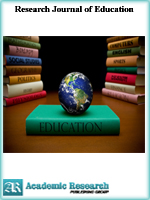Research Journal of Education
Online ISSN: 2413-0540
Print ISSN: 2413-8886
Print ISSN: 2413-8886
Quarterly Published (4 Issues Per Year)

Archives
Volume 5 Number 8 August 2019
The Three Characteristics of an Effective Teacher
Authors: Elock Emvula Shikalepo
Pages: 151-160
DOI: doi.org/10.32861/rje.58.151.160
Abstract
This study endeavored to establish the characteristics of effective teachers and how these characteristics assisted teachers to improve learner performance. To address this aim, a case study design was employed as a methodology for the study, consisting of five rural schools. A literature study was conducted, along with semi-structured individual interviews with five school principals and focus group interviews with twenty-eight teachers from the same rural schools from where school principals were drawn. The collected data were analyzed thematically, by establishing themes and their emerging categories. The established themes and their categories were interpreted and discussed to answer the research questions. The major findings of the study revealed that an effective teacher has a blend of three characteristics, namely, professional characteristics, personality characteristics, and social characteristics. The blend of characteristics contributes to the quality of teaching and learning processes. The study recommended that educational practitioners in diversity should be cognizant of the characteristics of effective teachers and nurture them appropriately as these characteristics have a life-transforming effects on the lives of the learners.
Influence of Self-Regulation and Social Competence on Academic Achievement of Lower Primary School Pupils in Osun State, Nigeria
Authors: Ekpenyong B. E. ; V. O. Adediran ; B. A. Adeyemi
Pages: 143-150
DOI: doi.org/10.32861/rje.58.143.150
Abstract
This study determined the prevalence of self-regulatory skills (behavioural, emotional, verbal) and assessed the level of social competence of primary school pupils in Osun State. The study further examined the influence of self-regulatory skills and social competence on primary school pupils’ academic achievement. These were with a view to providing information on the association between Self-regulation and Social Competence in relation to lower Primary School Pupils’ academic achievement in Osun State Nigeria. The study adopted the correlational survey research design. The population for the study comprised of primary III pupils in Osun State. The sample size consisted of 418 Primary III pupils selected using the multistage sampling procedure. Firstly, from the three Senatorial districts in Osun State, nine Local Government Areas (LGAs) were selected using simple random sampling technique (three from each senatorial district). Secondly, in each LGA, two primary schools were selected using simple random sampling technique. Thirdly, eighteen intact classes of primary Ill pupils were selected from each of the selected schools using the simple random sampling technique. The three instruments used for this study were: Sell-Regulation Observation Scale (SROS) Teachers Rating Scale (TRS); and Pupils’ Achievement Test (PAT). Data was analyzed using percentage and chi-square. The results showed that the level of primary school pupils’ behavioural self-regulatory skill was low (30%), emotional self-regulatory skill was at average (43%) while the verbal self-regulatory skill was low (27%). Overall, the level of self-regulatory skills of primary school pupils’ was low (39%). The results also indicated that the level of’ manifestation of social competence was high (64%). Results further showed that there was a statistically significant influence of self-regulatory skills and social competence on primary school pupils’ academic achievement (x2= 873.532, p<0.05). The study concluded that whilst Self-regulatory skill contributed little to pupils‘ academic achievement, Social Competence greatly influenced primary school pupils’ academic achievement in Osun State.
Faculty Perspectives on Narrowing the Success Gap Between Online and Onsite Learning
Authors: Abour H. Cherif ; Farahnaz Movahedzadeh ; Gerald Adams ; Margaret Martyn ; Jennifer D. Harris ; Stefanos Gialamas
Pages: 128-142
DOI: doi.org/10.32861/rje.58.128.142
Abstract
With the growth in enrollment in online courses at the university level, the quality of those courses is coming under increased scrutiny. This study surveyed faculty with experience in online, onsite, and blended courses to identify factors most likely to impede student success in online courses as well as strategies to improve online courses. The most common responses for why students might find online courses more challenging focus in the areas of time management, student-teacher interaction, and motivation. The strategies for improving student success in online courses fall into the categories of assignments, teaching strategies, and training for both the faculty and students. Steps for students to take before enrolling in an online course and tips for faculty who want to teach online courses for the first time are also included as appendices.



